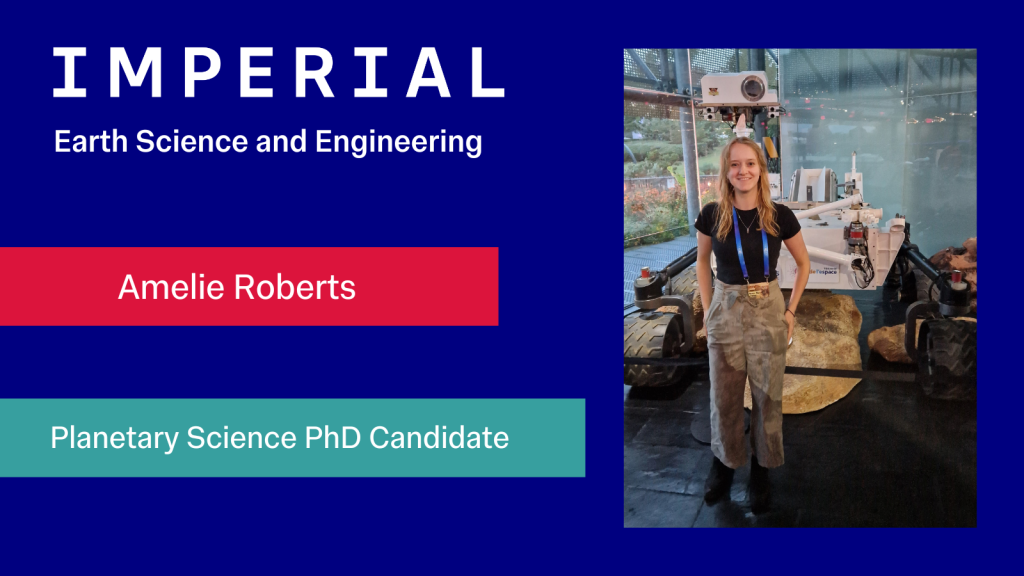Meet Amelie Roberts, a passionate PhD candidate at the Department of Earth Science and Engineering (ESE) at Imperial. She is studying the processes that shaped ancient Mars to unearth clues about its past habitability. Using a blend of rover exploration and satellite analysis, Amelie’s research will help us better understand the Red Planet (and our own!) and whether it was once able to harbour life.
In this ESE blog post, Amelie takes us on a journey through her academic journey so far, sharing her motivations, advice, and insights into her experience as a planetary scientist on the frontier of discovery.
Describe your PhD project in a tweet:
I explore ancient environments on Mars by analysing sedimentary deposits using rovers and satellites.
How do you see your research making an impact within and beyond academia?
My research focuses on examining ancient Martian environments and evaluating the planet’s historical habitability, aiming to address the question: Could Mars have been able to harbour life in the past?
My research also provides insight into how processes worked on ancient Earth. Mars is Earth’s sister planet, a rocky body which held liquid water but without a biosphere. We can use ancient Mars to understand the surface processes at work early in Earth’s history before it was covered by extensive vegetation. Specifically, my research focuses on surface processes on Mars involving wind and water.
What sparked your interest in your research area?
While I was interested in planetary science when I was a child, it was only later in my teenage years that I really developed a passion for science. Once I started university to study Chemistry, I took a Geology class and immediately fell in love with the subject, particularly the exploration of processes on other planets. I switched my degree to Geology after my second year and have pursued planetary science ever since.
Talk us through a typical day in your life as a PhD student. How do you maintain a healthy work-life balance?
A typical day in the life as a PhD student is incredibly varied. Some days are based on writing where I am most productive secluded away in a library or a cosy café. Other days, I work best in the office, enjoying coffee breaks and lunch with friends.
For me, a healthy work-life balance is important. I try my best to stick to a structured work week, with regular hours on weekdays and weekends free from work. However, flexibility is one of the great perks in academia. Occasionally, I may work on a weekend but then take a weekday off to compensate, or I might extend my work into the evening and then take the following morning off.
How do you navigate challenges and setbacks in your PhD journey?
One of the surprisingly challenging parts of a PhD is project management. You’re tasked with writing a thesis and answering research questions that have never been posed before. That’s a large amount of work for over a three-year period and so requires skills like time management, organisation, and adaptability. Personally, I’ve been working on how to break down big tasks into manageable daily goals. Embracing the mantra ‘little by little, a little helps a lot’ has been my guiding principle which reminds me of the power of incremental progress.
How do you embody the values of ESE in your research and academic endeavours?
I personally found the ESE values “supportive” and “inclusive” to be the most important. A strong research community that is supportive and inclusive provides the space and encouragement for people to be productive and do their best research. This is why I joined the Graduate Society when I started my PhD and have led the organisation of a number of department events such as the PhD conference and weekly Friday work drinks. I apply these values to the national space community as well, recently organising an Early Careers event for the United Kingdom’s Planetary Forum.
What motivated you to pursue your PhD at ESE?
ESE has a fantastic research reputation and has a large geoscience community. In particular, the ESE department has some links to international space missions. I chose to pursue my PhD at ESE for the chance to get involved in some of these missions.
What advice would you give to prospective PhD students considering a similar research path?
A PhD journey is a marathon, not a sprint, so my best advice would be to choose a research path wisely and enjoy the ride!
What do you do to wind down?
I enjoy spending evenings out with friends and escaping the city on countryside hikes. I also enjoy getting lost in a good book, TV series, or video game.
What are colleagues least likely to know about you?
I enjoy arts and crafts, particularly when I can learn and try out new things. Recently, I’ve been upcycling my jeans by teaching myself embroidery.
